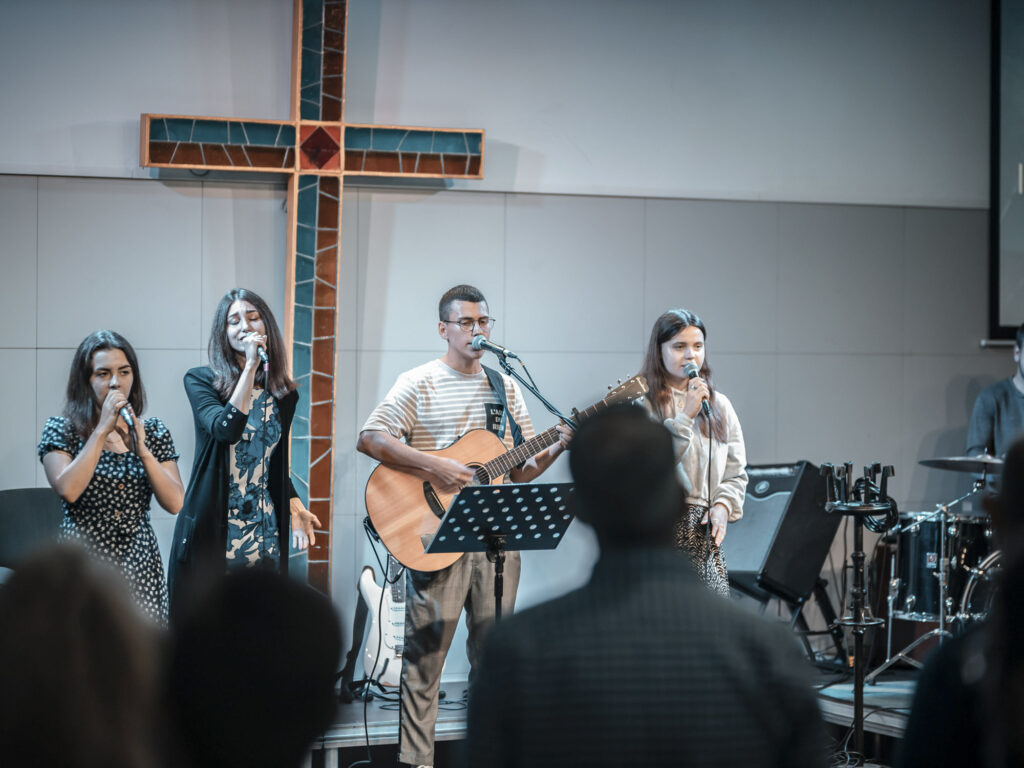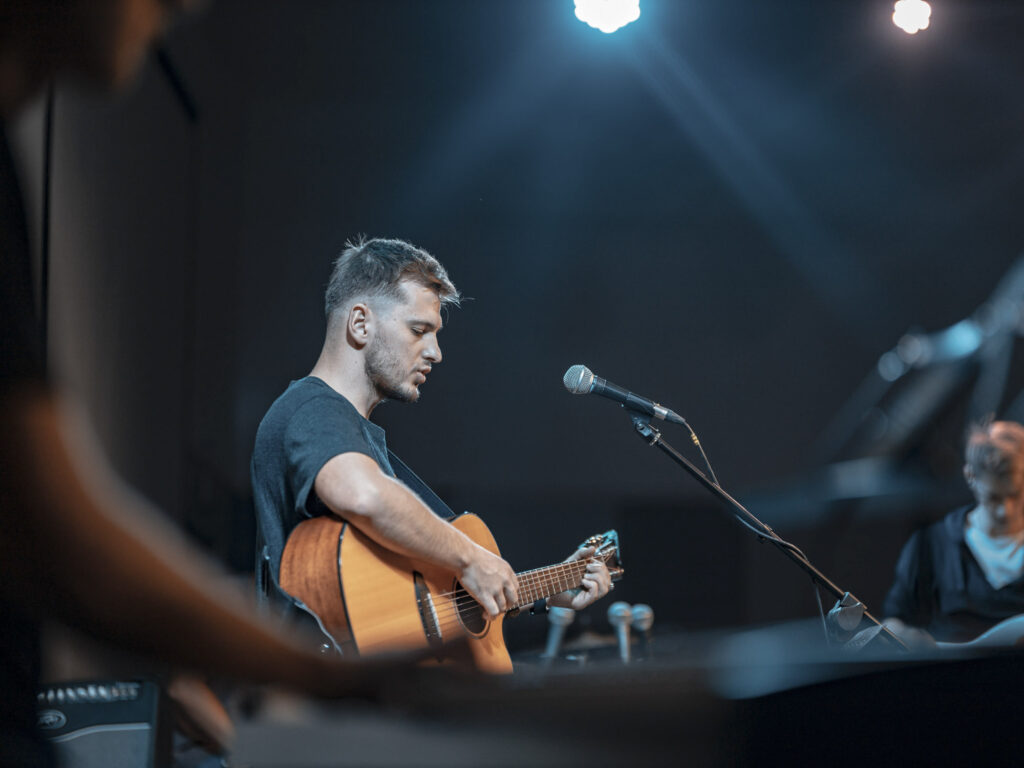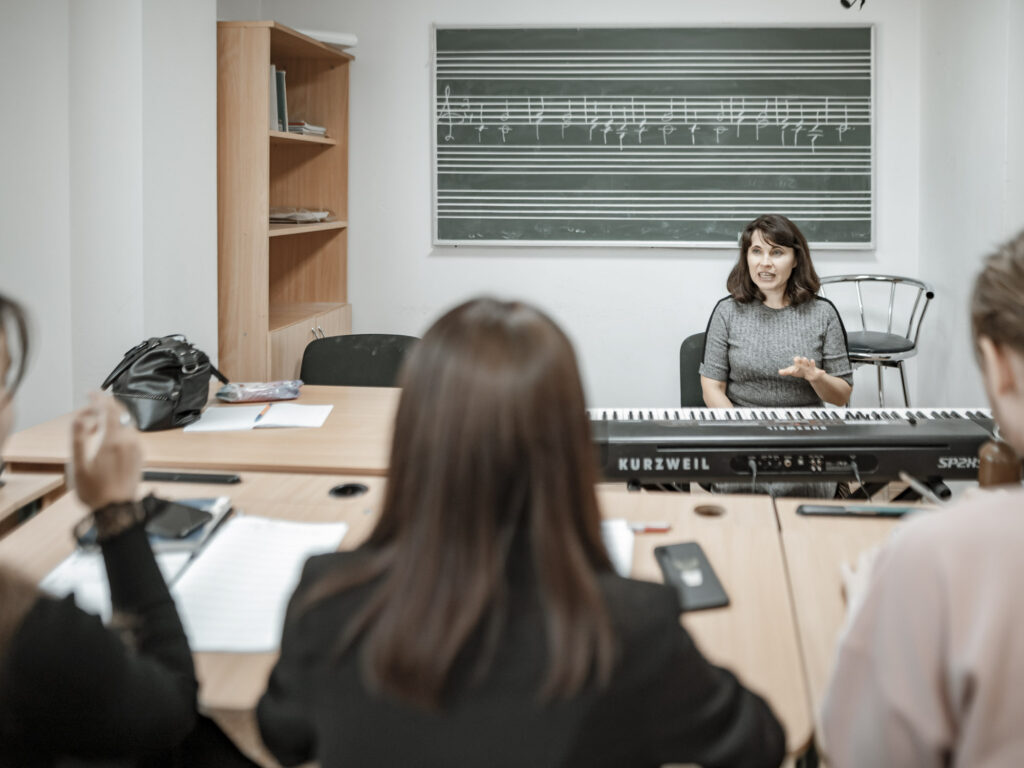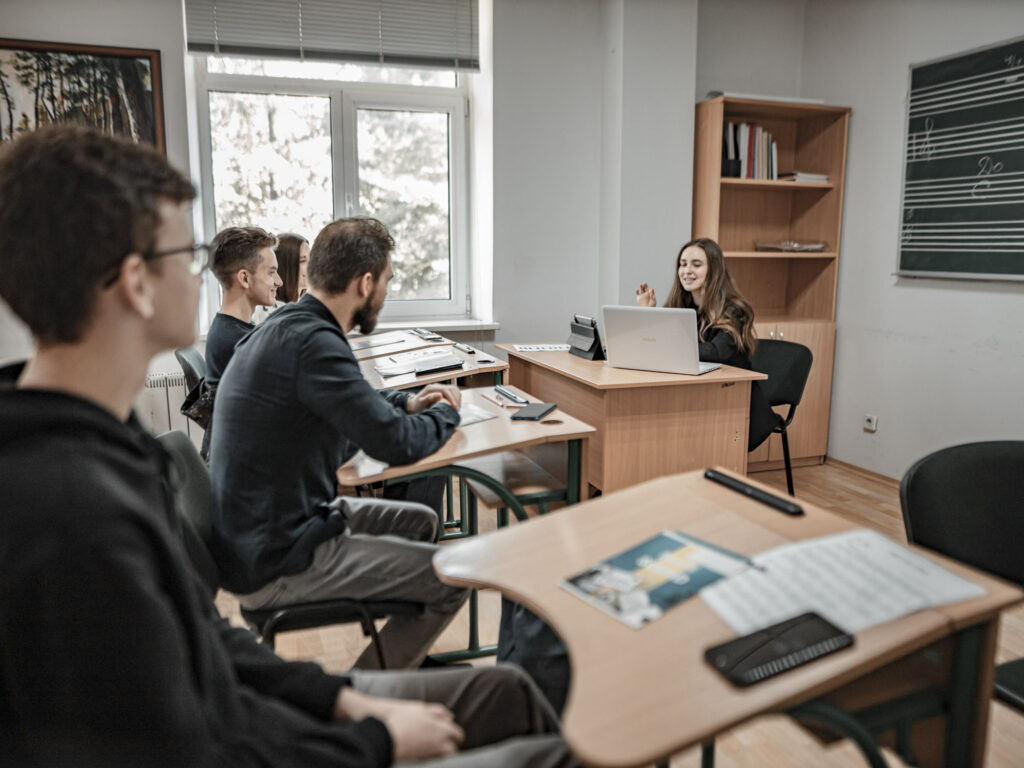


The program is aimed at training worship ministers who have theological perception of worship have sufficient music competence and skills are able to teach congregations theology through worship songs have instruments to form worship teams are able to lead a church in worshipping God and teaching others.



The course consists of 28 lectures. It analyzes the general development of music art in different historical periods, helps to understand the origin of modern music styles and genres, and familiarizes with the most popular works of music art.
The course is taught during the first and second semesters. It consists of 42 lectures. It analyzes major peculiarities of music elements (intervals, cords, scales) and logic of their correlation; develops skills of accurate note-writing (notes, pauses, rhythmic grouping, etc.); equips with knowledge of specific music terminology and forms the ability to operate it.
The course is taught during the first and second semesters. It includes 42 practical classes. The course reinforces basic knowledge in the field, develops music skills (hearing ability, memory, rhythm); helps to uncover creative abilities of students, familiarizes with theoretical foundations of the music art. Students practice by intoning scales, intervals, cords, sequences; identifying by ear certain rhythmic formulas and melodies.
The course is taught during two semesters. Students take it in groups, from 1 to 3 classes a week. The course comprises basics of the piano apparatus; basic note literacy; accompanying and playing cords; performing simple music works. The course plays an important practical role in development of music skills; has interdisciplinary links with subjects such as Solfeggio, Theory of Music, Harmony, Vocal and Instrumental Ensemble.
This practical specialized course is aimed at basic training of vocalists of worship teams as well as performers in the process of systematic vocals classes. 1 classroom hour / 1 time a week. In the first year, the course helps to learn basic principles of formation, development and protection of one’s voice as well as work on a piece of music.
The course is taught during the whole school year. It consists of 56 classroom training sessions / 2 hours a week. The course is aimed at forming instrumental and performing competence, and developing creative potential of a student in the process of his or her learning school guitar repertoire; training a student for instrumental and performing activities, independent professional work and participation in the worship team ministry.
The course is taught during the whole school year. It consists of 56 classroom training sessions / 2 hours a week. While studying, the student is getting ready for instrumental and performing activities in a band, develops own specialized instrumental and performing skills, broadens his or her music worldview through practical familiarization with leadings pieces of music of different music styles and genres of the modern and old popular and jazz music; develops figurative thinking and artistic taste.
This practical specialized course is taught for three years / 2 hours a week. It comprises getting correct statement of hands; mastering piano techniques; studying and analyzing modern pieces by notes; picking out a melody by ear; acquiring basic improvisation skills, ability to accompany, play one’s part by ear, ability to perform in a band, understand own role and function as a keyboard player in a church service. The main task is to equip a student with knowledge and skills for high-quality ministry at a local church.
Only those students are admitted to major in violin who have basic (music school) or special training (college). The course is taught during the whole school year. It includes 56 classroom training sessions / 2 hours a week. While studying, the student is getting ready for instrumental and performing activities in a band, develops own specialized instrumental and performing skills, broadens his or her music worldview through practical familiarization with well-known pieces of music in different music styles and genres of the modern and old popular and jazz music; develops figurative thinking and artistic taste.
The course introduces general notions of ethics and morale, compares secular and biblical ethical approaches as well as analyses the biblical foundation to solve practical issues in various spheres of ethics. It draws particular attention to ethical issues such as divorce and new marriage, admissible and inadmissible professions? admissible and inadmissible art, participation in political movements, intellectual property, etc.
Basic course that helps to shape a general holistic picture of the New Testament epoch and equips with fundamental knowledge of each book of the News Testament. The course consists of two blocks. The first one considers the historic, cultural and religious background of the New Testament. The second comprises issues of the canon and text of the New Testament as well as review of each book of the New Testament.
The modular course includes 24 hours of lectures, with 12 hours in the first semester and 12 hours in the second semester. While taking the course, students access a comprehensive description of biblical principles of praise and worship ministry in the contemporary evangelical church.
Choir class or show choir is a practical course that students master during three years. It includes classroom hours / 1 hour a week. The course helps to practically master biblical principles of worship, improve professional skills, and familiarize with the best samples of the world choir worship music heritage.
This practically-oriented course is one of the key courses of the program. It includes 3 classroom training sessions / 1 class a week. The course helps to model an effective rehearsal process during which students put into practice their knowledge of the theology of worship, acquire skills of harmonious ensemble work, and get trained to prepare for a musical part of a church service.
The course is intended to shape research skills in the realm of theology and church ministry. On the one hand, the course considers the role of research in the academic and spiritual life of the believer, raising questions such as “What does it mean to research and think critically?” “What is the role of knowledge?” How is faith connected to the mind?” On the other hand, the course draws attention to technical rules of writing research papers and reviews.
The course is aimed at spiritual formation of an individual in the light of evangelical traditions. The material harmoniously combines the study of theology and Christian spiritual practices. It draws special attention to spiritual practices such as search for God, prayer, reflections about the Scriptures, mentorship, fasting, solitude, etc.
The course is taught in the second semester. It includes 14 lectures / 1 lecture a week. It throws light on worship through studying the Old and New Testaments in order to develop and strengthen basic knowledge of the theology and worship in the context of studying the Bible. It pays special attention to relevant application of this theology in a contemporary church service.
The course is taught in the first (Solfeggio 3) and second (Solfeggio 4) semesters. It includes 28 lectures / 1 lecture a week. The course is aimed at developing music abilities (hearing ability, memory, rhythm) and identifying artistic talents. Students practice intonating more complicated elements of the language of music (seventh chords, musical modes of folk music), learn simple two-part textures (signing two-part works, writing two-part dictations), master complicated meter rhythms. Skills acquired in solfeggio classes help students actively use them in their art and performance practice.
The course is taught in the first (Applied Harmony 1) and second (Applied Harmony 2) semesters. It includes 28 lectures / 2 lectures a week. The course analyzes regularities of sound height organization of music, principles of organization of sounds in sound combinations (cords), mode functional and phonic norms of their connection and interconnection, principles of interaction between harmony and melody. The course also draws attention to practical learning and developing of the skills needed by future worship leaders and members of worship teams.
The course is taught during two semesters. It consists of 8 practical classes. Piano or keyboard is the main instrument. The Fundamentals of Harmonic Accompaniment is a practical course to study different approaches and ways of harmonization of vocal works when they are performed on a piano. The course comprises analysis of reason and selection of ways of arrangement, considering the role of the keys part in the ensemble. The course is closely connected with the course Applied Harmony and continues the course General Piano for the first-year students.
The course is taught in the first and second semesters. It includes 28 lectures / 1 lecture a week. The course studies arrangement as an aggregate of music phenomena and components as well as ability to organize them creatively and orderly. The theory is combined with the practice of arranging songs during rehearsals and in the studio.
The course is intended to provide students with basic principles to expound a biblical text, form a balanced approach to interpret the Scriptures and urge Christians to independently study the Bible. It comprises topics such as review of historic attempts to expound the Scriptures, different approaches to their interpretation, assessment of problems related to interpretation and ways to resolve them, determination of correct and incorrect approaches to expound the Bible.
The course is aimed at equipping students with skills to draw up a biblical, interesting, relevant and clearly structured sermon. It focuses mainly on development of the abilities to identify a key idea of a passage, outline the sermon, fill it with relevant content and illustration.
Choir class or show choir is a practical course that students master during three years. It includes classroom hours / 1 hour a week. The course helps to practically master biblical principles of worship, improve professional skills, and familiarize with the best samples of the world choir worship music heritage.
The course is taught in the second semester. It includes 14 lectures / 1 lecture a week. During the course, students study the biblical foundation of worship; varieties of worship which are practiced in a congregation and life of a Christian; ways to organize music ministry.
This practically-oriented course is one of the key courses of the program. It includes 3 classroom training sessions / 1 class a week. The course helps to model an effective rehearsal process during which students put into practice their knowledge of the theology of worship, acquire skills of harmonious ensemble work, and get trained to prepare for a musical part of a church service.
The course is taught in the second semester. It includes 14 lectures / 1 lecture a week. This is a fundamental course in music production whereby students master DAW, study interface, work with MIDI, and work with AUDIO. They also study the notion of the music form, the way to write and produce their music from the beginning of its creation up to streaming platforms and review of the system of music business in the world.
The modular course includes 15 classroom training sessions. Students independently master all theory through analysis of the provided material. In practical classes with an instructor students master different main music elements of various contemporary music styles, learn to distinguish styles as well as apply the obtained knowledge in practice.
The course discloses the fundamentals of the missionary work, in particular research of the Bible teaching on missions; history of the missionary work; role of culture in the missionary ministry; the strategy of the missionary work. It pays special attention to practical issues in connection with the development of the missionary activity of a local church.
This practical specialized course is aimed at basic training of vocalists of worship teams as well as performers in the process of systematic vocals classes. 1 classroom hour / 2 times a week. In the second year, the course helps to reinforce basic knowledge obtained in the first year of studies, and develop the quality of sound, vocal and creative performance skills due to familiarization with different music styles (primarily jazz).
The course is taught during the whole school year. It consists of 56 classroom training sessions / 2 hours a week. The course is aimed at forming instrumental and performing competence, and developing creative potential of a student in the process of his or her learning school guitar repertoire; training a student for instrumental and performing activities, independent professional work and participation in the worship team ministry.
The course is taught during the whole school year. It consists of 56 classroom training sessions / 2 hours a week. While studying, the student is getting ready for instrumental and performing activities in a band, develops own specialized instrumental and performing skills, broadens his or her music worldview through practical familiarization with leadings pieces of music of different music styles and genres of the modern and old popular and jazz music; develops figurative thinking and artistic taste.
This practical specialized course is taught for three years / 2 hours a week. It comprises getting correct statement of hands; mastering piano techniques; studying and analyzing modern pieces by notes; picking out a melody by ear; acquiring basic improvisation skills, ability to accompany, play one’s part by ear, ability to perform in a band, understand own role and function as a keyboard player in a church service. The main task is to equip a student with knowledge and skills for high-quality ministry at a local church.
Only those students are admitted to major in violin who have basic (music school) or special training (college). The course is taught during the whole school year. It includes 56 classroom training sessions / 2 hours a week. While studying, the student is getting ready for instrumental and performing activities in a band, develops own specialized instrumental and performing skills, broadens his or her music worldview through practical familiarization with well-known pieces of music in different music styles and genres of the modern and old popular and jazz music; develops figurative thinking and artistic taste.
The course is taught in the first (Applied Harmony 3) and second (Applied Harmony 4) semesters. It includes 28 lectures / 2 lectures a week in each semester. The course analyzes more complicated cords (principles of their composing, playing, sounding and using), essence and regularities of changes in the key of the first degree of interconnection, principles of ‘mode mutual exchange’ (cords of major-minor and minor-major), as well as principles of re-harmonization of music works. Special attention is paid to practical mastering and developing creative skills needed by future worship leaders and members of worship teams (the same as for the second-year students).
Choir class or show choir is a practical course that students master during three years. It includes classroom hours / 1 hour a week. The course helps to practically master biblical principles of worship, improve professional skills, and familiarize with the best samples of the world choir worship music heritage.
The practical course, which is taught in the first and second semesters, includes 14 lectures / a lecture a week. Students master computer software to create music, work on creation of new albums in a studio, study technical tools to accumulate and process audio materials.
This practically-oriented course is one of the key courses of the program. It includes 3 classroom training sessions / 1 class a week. The course helps to model an effective rehearsal process during which students put into practice their knowledge of the theology of worship, acquire skills of harmonious ensemble work, and get trained to prepare for a musical part of a church service.
The course considers a brief history of studying approaches to leadership, including a review of the present-day theories. The course is based on the assumption that there is no single understanding of leadership or its type, with different social demands prevailing in different periods of time.
The course is taught by instructors of the major - vocal or instrument. It is taught in the second semester, and includes 14 classroom hours. The course ends with an oral exam. Students learn the main elements of the methodology to teach vocals or an instrument.
This practical course includes 45 classroom training lessons. Students master ways to create vocal arrangements for different vocal composition and number of parts, develop skills to reasonably select harmony and create vocal parts for worship songs. It also presupposes using note editors in the process of completing practical assignments.
The course is taught in the first and second semesters. It includes 28 lectures / 1 lecture a week. The course studies arrangement as an aggregate of music phenomena and components as well as ability to organize them creatively and orderly. The theory is combined with the practice of arranging songs during rehearsals and in the studio.
The course, which is taught during one semester, includes 14 classroom trainings (lectures, seminars and different kinds of independent work). It comprises the studying of the main functions, objectives, vision of the worship leader, as well as principles of organization of music ministry at a local church. Some topics are taught by practicing ministers and narrow specialists such as pastors, worship leaders, experts in the sphere of management.
This practical specialized course is aimed at basic training of vocalists of worship teams as well as performers in the process of systematic vocals classes. 2 classroom hours / 1 time a week. In the third year, the course helps to develop skills of self-organization, repertoire selection, improvisation and vocal endurance of students.
The course is taught during the whole school year. It consists of 56 classroom training sessions / 2 hours a week. The course is aimed at forming instrumental and performing competence, and developing creative potential of a student in the process of his or her learning school guitar repertoire; training a student for instrumental and performing activities, independent professional work and participation in the worship team ministry.
The course is taught during the whole school year. It consists of 56 classroom training sessions / 2 hours a week. While studying, the student is getting ready for instrumental and performing activities in a band, develops own specialized instrumental and performing skills, broadens his or her music worldview through practical familiarization with leadings pieces of music of different music styles and genres of the modern and old popular and jazz music; develops figurative thinking and artistic taste.
This practical specialized course is taught for three years / 2 hours a week. It comprises getting correct statement of hands; mastering piano techniques; studying and analyzing modern pieces by notes; picking out a melody by ear; acquiring basic improvisation skills, ability to accompany, play one’s part by ear, ability to perform in a band, understand own role and function as a keyboard player in a church service. The main task is to equip a student with knowledge and skills for high-quality ministry at a local church.
Only those students are admitted to major in violin who have basic (music school) or special training (college). The course is taught during the whole school year. It includes 56 classroom training sessions / 2 hours a week. While studying, the student is getting ready for instrumental and performing activities in a band, develops own specialized instrumental and performing skills, broadens his or her music worldview through practical familiarization with well-known pieces of music in different music styles and genres of the modern and old popular and jazz music; develops figurative thinking and artistic taste.
You showed us that God is worthy of our best professional and spiritual preparation. God is always...
Graduate of the Music Ministry and Theology residential program
The seminary is God’s calling, God’s blessing in my life. I was well aware that I wanted to study...
Graduate of the Music Ministry and Theology residential program
For me, the seminary became not just a place where I got spiritual and musical education, but a...
Graduate of the Music Ministry and Theology residential program
My first impression from UETS can be discribed in three words: interest, workload and productivity....
Student of the Music Ministry and Theology residential program
I decided to study at UETS because I felt God's calling to continue studying at this institution (I...
Student of the Music Ministry and Theology residential program
I decided to study at UETS because I realized that I would have the opportunity to get a huge...
Student of the Music Ministry and Theology residential program
Studying at the seminary was a dream for me, so when the opportunity arose, I decided to enroll...
Student of the Music Ministry and Theology residential program
[cf7form cf7key=”zvyazatys-z-namy”]
Дякуємо за повідомлення, незабаром з вами зв’яжуться
Дякуємо за повідомлення, незабаром з вами зв’яжуться
